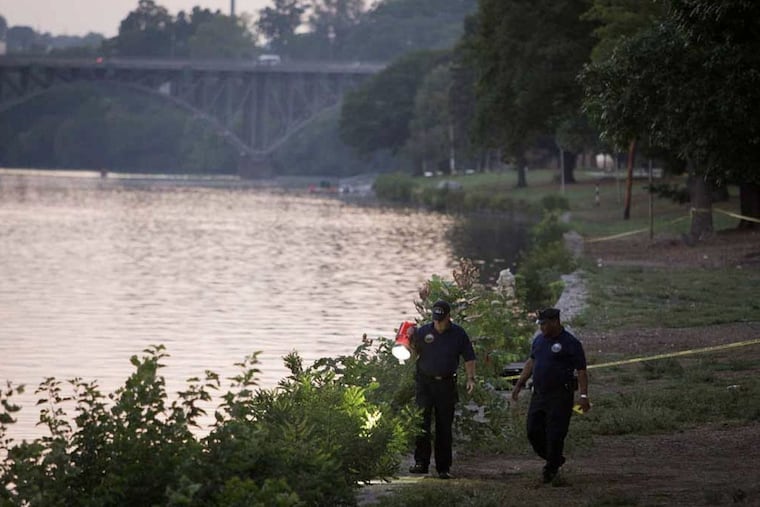Vietnamese gang leader sentenced to 11-plus years for plot that left brothers tortured, stabbed, and dumped in the Schuylkill
Lam Trieu, 51 once a ranking member of New York gang Born to Kill, told a judge he'd never intended for brothers Viet and Vu Huynh to be murdered when he sent associates to collect on a $300,000 debt.

His efforts to collect a drug debt ended in one of the most vicious incidents of gang violence the city has seen in a decade — the 2014 kidnapping and killing of two brothers whose bodies were found stabbed dozens of times, blindfolded with duct tape, weighted down by cement and tossed into the Schuylkill.
But as he was sentenced to more than a decade in federal prison Wednesday for his role in those crimes, Lam Trieu — a onetime ranking member of a Vietnamese gang that terrorized New York City — maintained that it was he who’d been “stabbed in the back.”
Trieu, 51, of New York City, told a federal judge he had no desire to see Viet and Vu Huynh harmed when he’d sent three associates to Philadelphia that year to collect $300,000 the brothers owed him and another supplier for fronted drugs.
He was sick, he added, when he later learned that the men he’d dispatched had brutally beaten and killed them.
“I never thought that they would do such a thing as they did,” he said, speaking to U.S. District Judge Gene E.K. Pratter through a Vietnamese interpreter. “But that thing already happened. There’s no way for me to change it.”
Pratter, however, remained unswayed. The sentence of 11 years and eight months she imposed fell just shy of similar punishments she’s doled out so far to others involved in the plot, including the men who drove in the knives.
“You can’t just wash your hands of something because you didn’t plan on it happening,” she said.
In all, six men have been convicted in connection with the Huynh brothers’ slaying, including their primary captor, Tam Minh Le, who was arrested on state murder charges and sentenced to death in 2016.
It took years, however, for investigators to track down the others involved in the crime, including Trieu.
Prosecutors have described both Le and Trieu as former ranking members of a gang of Vietnamese immigrants named Born to Kill, after a slogan painted on the helmets of some U.S. soldiers during the Vietnam War.
Based on Canal Street in Manhattan’s Chinatown in the ‘80s and ‘90s, Born to Kill’s members were mostly migrants who had fled the political strife the war created in their native country when they were children, only to turn their aggression toward Chinese and other Asian business owners after arriving in New York.
» READ MORE: How the FBI tracked linked a brutal 2014 murder to a gang that terrorized New York City in the '90s
They robbed rival gangs, ran protection rackets and left a string of bodies across New York and New Jersey before a 1993 federal prosecution sent much of the gang’s leadership, including Trieu, to prison.
While Born to Kill was believed to have died out after that case, Trieu’s old gang ties led directly to his involvement in the Huynh brothers’ deaths.
As he pleaded guilty to charges of conspiracy to distribute marijuana and to collect debts through extortionate means, Trieu admitted he’d reached out to Le, his old BTK associate, to collect on a $300,000 debt the brothers owed his marijuana supplier in California.
But while Trieu insisted Wednesday he’d only intended for Le to “maybe make some threat” to convince the Huynhs to pay, Le and the three men Trieu had sent from New York to help bundled the brothers into a van, drove them back to Le’s house in Eastwick, tortured them, and then drove them to the river to die.
A third man, taken and attacked with the brothers, managed to climb his way out of the inky depths, flagged down police and survived to later testify against some of his captors at trial.
“To do what they did is a terrible thing — to put tape on their mouths, to stab them, to slit their throats and throw them into a river,” Trieu’s lawyer Paul G. Lieber said. “It’s unimaginable to Mr. Trieu. … That’s pure evil.”
Pratter, the judge, showed little sympathy for that argument throughout Wednesday’s proceedings. But Assistant U.S. Attorney Robert Livermore Jr. suggested there was likely some truth to what Trieu was saying.
After his 2018 arrest, Trieu assisted investigators and testified at the trial of one of the men he’d dispatched to help Le — cooperation that the prosecutor maintained had earned him a break at sentencing. Livermore believed Trieu when he said he didn’t send Le to kill the Hunyhs, he said.
“Dead drug dealers don’t pay debts, and Mr. Trieu wanted his money,” he said. “When he says that he didn’t expect the victims to be killed, I think he’s being honest in that regard.”
Still, Livermore added: “Mr. Trieu didn’t lay a hand on the victims, but he was the one who set everything in motion.”
For his part, Trieu said all he wanted now was a chance to return to his family.
Before his arrest, he’d been living with his wife and two children in Queens, working in a dim sum restaurant. He told Pratter he hoped to find a job as a technician at a nail salon after his release.
“I just feel so sorry for my family,” he said. “I don’t even know what to think.”
Pratter shot back: “I’m sure you don’t. And for the record I feel sorry for your family, too.”